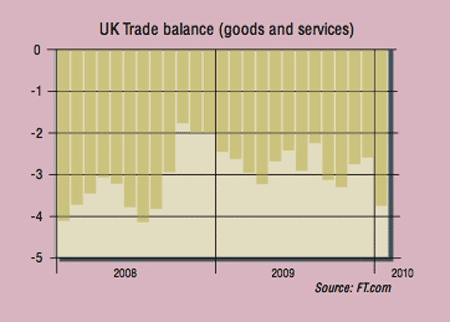
Ministers are “rightly nervous” about the first-quarter GDP data to be released on 23 April, shortly before polling day, said Larry Elliott in The Guardian. Industrial production unexpectedly suffered a relapse in January, dropping by 0.4%. That news followed disappointing February retail sales. The housing market appears to be turning down again. The latest Royal Institution of Chartered Surveyors survey reported a fall in the number of surveyors reporting rising prices, and Nationwide and Halifax both reported price falls in February.
The biggest disappointment, however, was the widening trade gap. The trade deficit in goods and services reached £3.8bn in January, the highest monthly total since August 2008. Goods exports slipped by 7%. The overall deficit in the three months to January was up year-on-year. Along with ratings agency Fitch’s warning that the government’s debt-reduction timetable was “frankly too slow”, the release sent the pound to a new ten-month low against the dollar.
What the commentators said
With the domestic economy struggling, everyone is counting on a growth boost from exports, due to the falling pound, which has tumbled by 25% against a basket of currencies over two years. Yet “it is clear that the much-needed rebalancing of the UK economy towards export-led growth is not happening”, said David Kern of the British Chambers of Commerce.
Why not? One problem is that it’s hard to grow exports “when the rest of the world is crawling out of a slump”, said Neil Collins on Breakingviews. Yet that’s not the full story. While the recovery may have stalled in Europe, our biggest trading partner, the balance of trade in goods to non-EU countries has also deteriorated.
Manufacturers are using sterling’s slide to bolster depressed margins rather than generate new sales and grow market share with price cuts, notes Elliot. The pound’s fall means that their profits rise if they keep prices unchanged. This is “understandable”, but means exports won’t grow as expected. But it also looks as though industry is now “so hollowed out” that it is no longer capable of exploiting the weak pound.
“We simply don’t produce enough manufactured goods any longer” to benefit from currency depreciation, agreed Jeremy Warner on Telegraph.co.uk. And our services don’t generate much extra volume from a lower pound as they are not especially price-sensitive. All of which leaves us with a big problem. The private sector is cutting back and the public sector is also set to “restore balance-sheet health”. “If there is to be no improvement in the external balance to compensate… then the prospects for growth are not good.”